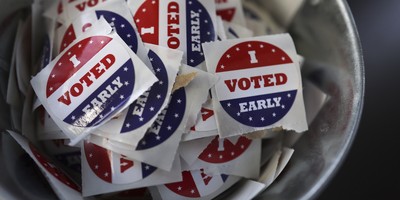It’s the economy stupid! Every American is going to sleep at night tossing and turning over it. Each American is grappling with their distinct economic fiend and will have the opportunity to parry it in the ballot box this November.
Dr. Tom Woods could have not predicated a better time to be releasing an adaption of his #1 NY Times Bestseller, Meltdown into a film adaption, The Bubble.
Collaborating with director Jimmy Morrison, Woods makes the iconoclastic case that the free market wasn’t the culprit in the crash. The film features a cast of free market thinkers including James Grant (Grant Interest Rate Observer), Jim Rogers (Rogers Holdings), Congressman Ron Paul, Peter Schiff (Euro Pacific Capital), Gene Epstein (Barrons) and many others that foresaw the crash, the growing bubble economy, and the crash to come.
Meltdown was the first book to discuss the economic crisis and the political response, released in late February of 2009. Woods’ analysis of the cause of the crisis has become the dogma for any advocate of the free market.
Wood’s testimony is that the crash was caused by five key factors:
1) The Federal Reserve facilitated the housing bubble by lowering interest rates, incentivizing banks to lend freely, and structuring a paradigm incapable of handling fluctuations in the economy.
2) Government Sponsored Enterprises, Fannie Mae and Freddie Mac, subsidized the guarantee home mortgages. The government guaranteed their liabilities when they were nationalized in September of 2008. Banks underwrote bad mortgages and sold them to secondary markets that were created by Fannie and Freddie.
Recommended
3) Government home ownership policies, especially the mortgage income tax deduction, artificially stimulated home purchasing. These policies were promoted by the idea that homeownership would promote responsibility and push more people into the middle class.
4) By 2008 non-traditional mortgages, including subprime loans and alt-a-loans, comprised 50% of home lending.
5) Additional policies greatly accelerated home purchasing.The Department of Housing and Urban Development (HUD) required 50% of mortgages to be allocated to people who were at or below the median income of their communities. The Community Reinvestment Act required lenders to give a quota of home mortgages to low-income people.
Woods and his assembled team of economic masterminds make it a point in The Bubble to express that the free market and deregulation were at no point at fault for the economic collapse. Woods compares the economic crisis of today to crisis of the past, most notably the Recession of 1920, The Great Depression, and Inflation in the 1970’s.
As the fourth anniversary of the crash approaches, many Americans especially the millennial generation fears for the job market, student loan crisis and monetary policy, as the future seems increasingly unstable. Dr. Woods said in an interview with this author, “We need to keep an eye on the money supply. What the Fed created during the recession is not simply going to go away… more than likely we are going to see a period of stagflation.”
Woods closes his film with the crisis ahead, besides the uncertainty of low growth for what could be a similar scenario to the stagflation that engulfed Japan for over a decade the United States faces a perfect economic storm. According to The Bubble, the education bubble, the likelihood of price inflation, national debt bubble and unfunded liabilities bubble could sink the US into further turmoil.
Many are looking to leadership in the new Congress as the answer to avert many of these future crises, but Woods was less optimistic, “I say wait and see, give them twenty years in Congress and then look at their records. Many people make good speeches every once in awhile but when it comes to their records their pretty terrible.”
Mr. Woods expressed his need to change the narrative the nation is having on our current economic state of affairs, “The reason I wrote this book is I wanted to show people the free market version to crash and why it happened. We have this film that has people in that should make up the cabinet positions of any politician but are ridiculed because they are showing the free market aspect to the crisis and instead we are stuck reading to Paul Krugman, or listening to politicians like Barney Frank or John McCain.”
Mr. Woods had equal contempt for the establishment media as he did the establishment politicians, “Michele Bachmann was ridiculed for reading my book on business cycles, of all the things you could or should criticize a politician for, understanding the business cycle should not be one of them. I dare any people especially on the left to even define a business cycle.”
With a dreary backdrop and few very hopeful prospects in the halls of White House or Congress, I asked the author for some reassurance as a millennial looking at a nation who’s future has gone awry. Mr. Woods went back to his reason for writing the book and making the film adaptation, “. I think we can get ourselves out of this mess if we educate ourselves on what is going on, how and why… If we are able to better understand how the free market and the economy works we will be better capable of getting out of this current recession.”
This writer’s only fear is, to quote Benjamin Disraeli, “Upon the education of the people of this country, the fate of this country depends.” The next few elections will prove if America has learned too little, a little too late.

























Join the conversation as a VIP Member